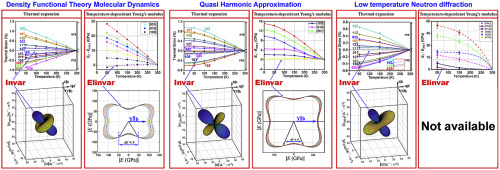当前位置:
X-MOL 学术
›
Acta Mater.
›
论文详情
Our official English website, www.x-mol.net, welcomes your
feedback! (Note: you will need to create a separate account there.)
Neutron diffraction study of temperature-dependent elasticity of B19′ NiTi--Elinvar effect and elastic softening
Acta Materialia ( IF 8.3 ) Pub Date : 2019-07-01 , DOI: 10.1016/j.actamat.2019.05.027 A. Ahadi , R. Khaledialidusti , T. Kawasaki , S. Harjo , A. Barnoush , K. Tsuchiya
Acta Materialia ( IF 8.3 ) Pub Date : 2019-07-01 , DOI: 10.1016/j.actamat.2019.05.027 A. Ahadi , R. Khaledialidusti , T. Kawasaki , S. Harjo , A. Barnoush , K. Tsuchiya

|
Abstract The temperature-dependent elasticity of the B19′ NiTi is unknown today. To gain insights into the lattice-level temperature-dependent elasticity of the B19′ crystal, we present results of in-situ neutron diffraction experiments performed on polycrystalline martensitic specimens in the temperature range of 300 down to 50 K. The experimental results are compared with the density functional theory molecular dynamics (DFT-MD) and Quasi Harmonic Approximation (QHA) calculations. The results confirm that the temperature-dependent Young's modulus (TDYM) of the B19′ crystal is strongly anisotropic. For different crystallographic orientations, the change in Young's modulus over the temperature range of 300–50 K ( Δ E ( h k l ) = E ( h k l ) 50 K − E ( h k l ) 300 K ), ranges from Δ E ( 10 2 ¯ ) = 2.8 ± 3.5 GPa (extremely weak dependence) to Δ E ( 103 ) = 59.6 ± 9.1 GPa (strong dependence). Moreover, it is found that the orientation-specific TDYM and thermal expansion (TE) of the B19′ crystal are correlated. The crystallographic orientations with weak and negative TE responses exhibit a weaker TDYM than the orientations with positive TE. The DFT-MD and QHA results capture qualitatively the above experimental observations and further show that there are orientations in a B19′ crystal exhibiting elastic softening ( Δ E ( h k l ) Δ E ( h k l ) = 0) with cooling. This is found to originate from the strong negative temperature dependence of c35 stiffness constant. The experimental results along with the first-principles calculations confirm that the Elinvar and Invar are two confluent properties in NiTi SMAs and can be tailored by texturing B19′ crystallographic orientations.
中文翻译:

B19′NiTi--Elinvar效应与弹性软化的温度相关弹性的中子衍射研究
摘要 B19' NiTi 的温度依赖性弹性目前尚不清楚。为了深入了解 B19' 晶体的晶格级温度相关弹性,我们展示了在 300 至 50 K 的温度范围内对多晶马氏体试样进行的原位中子衍射实验的结果。实验结果与密度泛函理论分子动力学 (DFT-MD) 和准谐波近似 (QHA) 计算。结果证实 B19' 晶体的温度相关杨氏模量 (TDYM) 具有很强的各向异性。对于不同的晶体取向,杨氏模量在 300–50 K ( Δ E ( hkl ) = E ( hkl ) 50 K − E ( hkl ) 300 K ) 范围内的变化范围为 Δ E ( 10 2 ¯ ) = 2.8±3。5 GPa(极弱的依赖性)到 Δ E ( 103 ) = 59.6 ± 9.1 GPa(强依赖性)。此外,发现 B19' 晶体的取向特定 TDYM 和热膨胀 (TE) 是相关的。具有弱和负 TE 响应的晶体取向表现出比具有正 TE 的取向更弱的 TDYM。DFT-MD 和 QHA 结果定性地捕获了上述实验观察结果,并进一步表明 B19' 晶体中存在取向,随着冷却表现出弹性软化(Δ E ( hkl ) Δ E ( hkl ) = 0)。发现这源于 c35 刚度常数的强烈负温度依赖性。
更新日期:2019-07-01
中文翻译:

B19′NiTi--Elinvar效应与弹性软化的温度相关弹性的中子衍射研究
摘要 B19' NiTi 的温度依赖性弹性目前尚不清楚。为了深入了解 B19' 晶体的晶格级温度相关弹性,我们展示了在 300 至 50 K 的温度范围内对多晶马氏体试样进行的原位中子衍射实验的结果。实验结果与密度泛函理论分子动力学 (DFT-MD) 和准谐波近似 (QHA) 计算。结果证实 B19' 晶体的温度相关杨氏模量 (TDYM) 具有很强的各向异性。对于不同的晶体取向,杨氏模量在 300–50 K ( Δ E ( hkl ) = E ( hkl ) 50 K − E ( hkl ) 300 K ) 范围内的变化范围为 Δ E ( 10 2 ¯ ) = 2.8±3。5 GPa(极弱的依赖性)到 Δ E ( 103 ) = 59.6 ± 9.1 GPa(强依赖性)。此外,发现 B19' 晶体的取向特定 TDYM 和热膨胀 (TE) 是相关的。具有弱和负 TE 响应的晶体取向表现出比具有正 TE 的取向更弱的 TDYM。DFT-MD 和 QHA 结果定性地捕获了上述实验观察结果,并进一步表明 B19' 晶体中存在取向,随着冷却表现出弹性软化(Δ E ( hkl ) Δ E ( hkl ) = 0)。发现这源于 c35 刚度常数的强烈负温度依赖性。













































 京公网安备 11010802027423号
京公网安备 11010802027423号